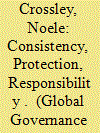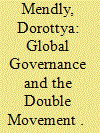|
|
|
Sort Order |
|
|
|
Items / Page
|
|
|
|
|
|
|
| Srl | Item |
| 1 |
ID:
174654


|
|
|
|
|
| Summary/Abstract |
Powerful states often use tools of economic statecraft, such as foreign aid and other financial policy instruments, in a bid to “purchase” influence as well as establish regional leadership among their neighbors. How and why do these states undertake similar economic statecraft strategies and policies? The article examines the evolution of infrastructure financing policy of China and Japan and identifies the ever changing and, yet at the same time, mirroring interaction between the two countries’ development finance practices. We argue that emulation and competition have led to the process of policy diffusion between these two countries. The competition between these two foreign aid leaders in East Asia especially after China’s Belt and Road Initiative has shaped the region’s infrastructure development dynamics as they strive to move the equilibrium outcome to their advantage. Such equilibrium through the policy diffusion process has important implications on global development governance.
|
|
|
|
|
|
|
|
|
|
|
|
|
|
|
|
| 2 |
ID:
174651


|
|
|
|
|
| Summary/Abstract |
Will the rise of China, an authoritarian, party-state with a poor record of protecting its citizens’ human rights, undermine humanitarian intervention? This question has been particularly pertinent since China’s “assertive turn” in foreign policy. Drawing on the case of Chinese reactions to the humanitarian crisis in Syria, this article argues that China’s attitude toward humanitarian intervention remains ambiguous and contradictory. While China has at times prevented the UN Security Council from threatening sanctions on Syria, it has not necessarily denied that a humanitarian crisis exists. The article shows that the People’s Republic of China is beginning to act more as a norm maker than norm taker, and is offering its own vision of humanitarian intervention, coined as “responsible protection.”
|
|
|
|
|
|
|
|
|
|
|
|
|
|
|
|
| 3 |
ID:
174655


|
|
|
|
|
| Summary/Abstract |
Selective humanitarianism, it has been argued, may be condonable, or even preferable. Several arguments have been proffered in support of these views. This article revisits these arguments in light of the emergence of a discourse of protection and responsibility that now incorporates a wider spectrum of protection measures available to agents, of which armed intervention is but one. Consistency is an essential characteristic of ethics and the law—inconsistent practice diminishes the prospects of the development of norms of protection and associated practices and institutions. Furthermore, inconsistent practice means that fewer people receive protection from egregious violations of human rights. If the principles associated with human protection and humanitarianism are to become established norms of international society, international policy must be coherent, and international practice must be consistent.
|
|
|
|
|
|
|
|
|
|
|
|
|
|
|
|
| 4 |
ID:
174656


|
|
|
|
|
| Summary/Abstract |
This article reconstructs the evolution of global governance through time, in a perspective organized around Karl Polanyi’s double movement. Starting from present-day global governance, the article reaches back in time to understand the different socially and historically contingent layers that have constituted it as a discourse and a set of practices. It argues based on the notion that global governance is a hegemonic discourse of world politics, and claims that it is so because it has become inclusive enough to accommodate both the “movement” and the “countermovement” in its cognitive and material structures. In this order of knowledge, the “healthy functioning” of the global economy always precedes the existence of prosperous societies, and comes before maintaining harmony in the ecosystem. This order sustains the active-reactive dynamics of the double movement and limits the possibilities of change in global governance.
|
|
|
|
|
|
|
|
|
|
|
|
|
|
|
|
| 5 |
ID:
174652


|
|
|
|
|
| Summary/Abstract |
This article applies and expands on a typology of organizational corruption control to analyze the various mechanisms used to address corruption within the Fédération Internationale de Football Association (FIFA). It uses case study evidence in tandem with insights from neo-institutional theory to construct a conceptual framework in which corruption control types are more completely examined within their broader institutional context. Using this framework, the article shows how the persistence of corruption in FIFA and its checkered reform process are attributable to an organizational filtering phenomenon that has limited the operation of internal and external corruption controls. Finally, it discusses some implications of this framework for transnational organizational governance reform.
|
|
|
|
|
|
|
|
|
|
|
|
|
|
|
|
| 6 |
ID:
174653


|
|
|
|
|
| Summary/Abstract |
Since the 1997 Asian financial crisis, East Asia’s ASEAN+3 states have built the second-largest regional emergency liquidity fund in the world, the Chiang Mai Initiative Multilateralization (CMIM). With a total commitment of $ 240 billion to aid member states facing a currency crisis, CMIM can provide more funds to members than the International Monetary Fund (IMF). Nonetheless, CMIM continues to be functionally subordinate to IMF decisions. This may now be changing following the 2011 creation of the ASEAN+3 Macroeconomic Research Office (AMRO) as a regional mechanism to manage surveillance and design of CMIM lending programs. The ability to delegate surveillance and program design to an independent body is a crucial prerequisite to ending CMIM’s subordination to the IMF, and AMRO seeks to ensure such autonomy through its institutional design. This article analyzes AMRO’s progress toward autonomy, using indicators of effective delegation drawn from organizational theory and newly available information and data on AMRO.
|
|
|
|
|
|
|
|
|
|
|
|
|
|
|
|
| 7 |
ID:
174649


|
|
|
|
|
| Summary/Abstract |
Since its establishment in 1950, the UN High Commissioner for Refugees (UNHCR) has expanded significantly in terms of its size and geographical presence, as well as the range of policy concerns and operational activities in which it is engaged. But as the organization approaches its 70th anniversary, its limitations and constraints are being exposed in an unusually explicit way, raising important questions about the future of the international refugee regime.
|
|
|
|
|
|
|
|
|
|
|
|
|
|
|
|
| 8 |
ID:
174650


|
|
|
|
|
| Summary/Abstract |
The Office of the UN High Commissioner for Refugees (UNHCR) turns 70 in 2020. This auspicious birthday coincides with one of the greatest global crises since the wars of the 20th century. From its emergence in early 2020, COVID-19, the new coronavirus, has led to the kind of pandemic not seen since 1918. The world is in a state of shock, reeling from the growing death toll, the enormous strain on health services and workers, and economic destruction. At the macro level, the pandemic has “done more to close borders, reverse globalization, decouple supply chains and marginalize multilateral institutions than the most fervent efforts of the world’s populist nationalists.”1 The world is “reverting to its smallest constituent parts—from international system to nation state to city to socially-isolated family unit.” A shock of this nature is not a “freeze-frame moment”; rather, business as usual may remain elusive, even when circumstances allow.2
|
|
|
|
|
|
|
|
|
|
|
|
|
|
|
|
|
|
|
|
|